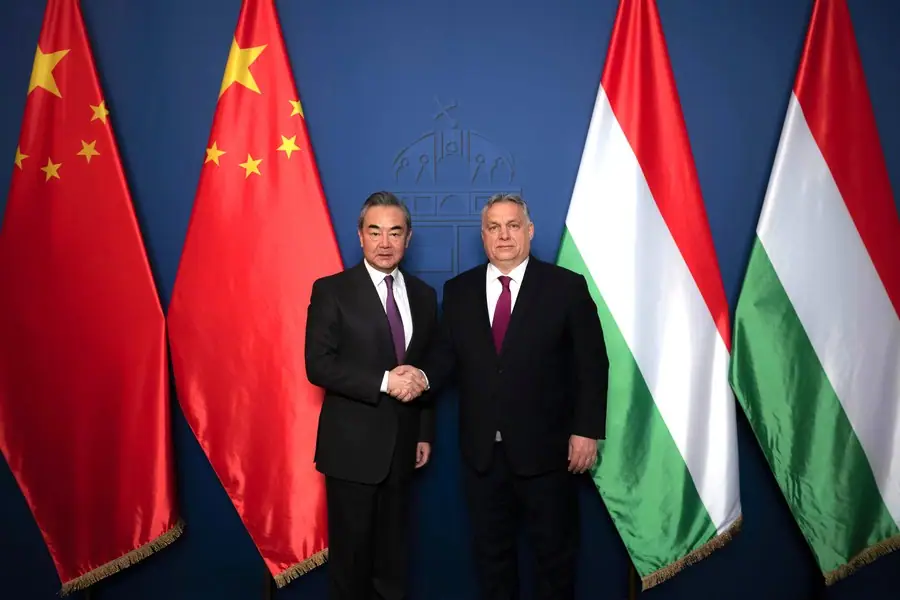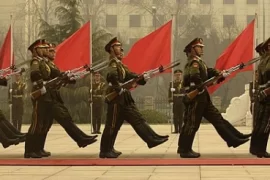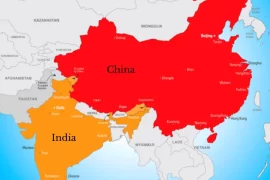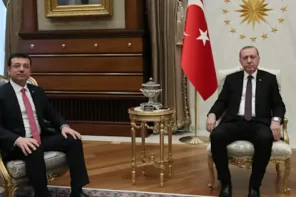China and Hungary have had diplomatic relations since 1949, with the establishment of the People’s Republic of China. In recent years, the two countries have been strengthening their bilateral ties through economic, political, and cultural cooperation. Director of the Office of the Foreign Affairs Commission of the CPC Central Committee Wang Yi lauded China-Hungary relations as a model for international relations during his meeting with Hungarian President Victor Orban on February 19, 2023.
Trade and Investment
Trade and investment are the cornerstone of the China-Hungary relationship. China is Hungary’s largest trading partner outside of the European Union. According to Chinese customs data, bilateral trade between the two countries reached $15.71 billion in 2021, up by 34.5% compared to the previous year. Hungary mainly exports pharmaceuticals, machinery, and chemicals to China, while importing electronics, machinery, and textiles.
In March 2023, China exported goods worth $884 million and imported goods worth $419 million. Over the period from March 2022 to March 2023, China’s exports to Hungary experienced a modest increase of $7.68 million (0.88%), rising from $877 million to $884 million. Similarly, imports from Hungary to China saw a more substantial growth of $42.8 million (11.4%), ascending from $376 million to $419 million.
China has become Hungary’s biggest foreign investor despite the pandemic. Chinese companies have been investing heavily in Hungary in recent years. Huawei, one of China’s leading telecommunications companies, established its first European logistics center in Hungary in 2019. In the same year, the Chinese state-owned company CRRC Zhuzhou Locomotive invested in a Hungarian electric bus manufacturer, thereby strengthening the two countries cooperation in the green energy sector. Chinese companies are also showing interest in investing in the Hungarian automotive and energy industries.
Hungary and Belt and Road Initiative
In 2015, Hungary became the first European Union member to sign a cooperation document with China regarding the Belt and Road Initiative (BRI). This move aligns with Hungary’s “Opening to the East” policy, and notable projects such as the Hungary-Serbia railway have made steady progress as a result. The Chinese-backed high-speed rail line is projected to be completed by 2025, substantially reducing travel time between Budapest and Belgrade. Furthermore, it will facilitate faster transportation of Chinese goods, which can enter the European market more efficiently through Greek ports.

For the Hungary-Serbia railway project, Hungary secured a loan of $2 billion from China, while Serbia obtained $1.8 billion in loans from Chinese banks. Additionally, both countries received funds from the European Union and Russia to support this endeavor.
Critics from opposition parties in Hungary have raised concerns about the multi-billion dollar rail project, citing issues such as inflated costs and allegations of favoritism in contract allocation. In Hungary, the government-associated entrepreneur, Lőrinc Mészáros, secured the construction bid through his company, “RM International Zrt.” The project also involved the participation of two Chinese companies: China Tiejiuju Engineering & Construction LLC and China Railway Electrification Engineering Group (Hungary) Ltd.
In December 2022, however, China and Hungary further solidified their bilateral ties by agreeing to establish an intergovernmental Belt and Road cooperation committee, signifying their commitment to strengthening cooperation and collaboration within the framework of the Belt and Road Initiative.
China-Hungary Political Relations
China and Hungary have been strengthening their political relations in recent years. Hungarian Prime Minister Viktor Orbán has been an advocate of closer ties with China and has been vocal about his support for China’s Belt and Road Initiative (BRI). In 2019, Hungary became the first European country to sign a memorandum of understanding with China on the BRI, which aims to enhance connectivity and infrastructure development between Asia and Europe.
China’s President Xi Jinping visited Hungary in 2019, during which the two countries signed a series of agreements on trade, investment, and tourism. President Xi also attended the China-Central and Eastern Europe (CEE) Summit, which was held in Budapest. The CEE Summit is a platform for China to engage with 17 countries in the region, including Hungary, on trade and investment.
During the COVID-19 outbreak, China granted priority to Hungary by providing them with 5 million vaccine doses. In a departure from the EU consensus that COVID-19 vaccines used within the bloc should receive EU approval first, Hungary took the unique step of approving and utilizing Chinese vaccines, making it the first country to do so.
During an annual news conference in Budapest in December 2022, Orban rejected America’s calls for decoupling, isolation or breaking ties with China. He dismissed such narratives as “huge mistakes” and warned that Europe’s competitiveness would suffer without cooperation with Beijing.
Despite EU officials’ emphasis on de-risking relations with China and considering the country as a “systematic rival,” Hungarian Foreign Minister Peter Szijjarto expressed a different perspective during his visit to Beijing on May 15, 2023. He stated that the cooperation between Hungary and China offers opportunities rather than risks.
As a member of the European Union, Hungary exercises its veto power to weaken or block EU statements that are critical of China.
Hungarian Government’s Position Regarding Ukraine
Regarding the Ukraine issue, Wang Yi and Victor Orban, during their meeting in February 2023, emphasized the importance of maintaining calm and urged all parties to make choices that align with international norms and Europe’s long-term interests.

China-Hungary cultural relations
Cultural exchanges between China and Hungary have been on the rise in recent years. The two countries have been holding various cultural events to promote their respective cultures. For example, in 2019, the Hungarian Museum of Fine Arts held a Chinese art exhibition titled “Treasures from Budapest – European and Chinese Masterpieces from the National Museum of Hungary and the Shanghai Museum.”
In addition, China has been providing scholarships for Hungarian students to study in China. The number of Hungarian students studying in China has been increasing, and the two countries have been working together to promote academic cooperation.
On June 5, 2021, approximately 10,000 individuals participated in a march in Budapest to express their opposition to the construction of the first Chinese university campus in Hungary. The Hungarian and Chinese governments had signed an agreement to establish a campus for Shanghai’s Fudan University in the city. However, local authorities, concerned about academic freedom, education quality, and China’s increasing influence in the country, opposed the project. The construction of the campus was estimated to cost $1.8 billion, with 80% of the funding coming from a Chinese loan.

The large-scale protest prompted a change in the Hungarian government’s stance on the plan, as they became alarmed by the public outcry. As a result, the construction plans were abandoned. In the southern part of Budapest’s city center, the street signs serve as a reminder of the protest. Notable street names include Uyghur Martyrs Street, Bishop Hszie Si-kuang Street (named after Xie Shiguang, a late Catholic bishop who had been imprisoned for 30 years), and Dalai Lama Street.
What do Hungarians think of China?
Among European Union countries, Hungarian citizens have been regarded as one of the most supportive of China. However, according to a survey conducted by the American think tank Pew Research Centre in 2022, 52% of respondents in Hungary expressed negative views of China, marking a 15-point increase since 2019. There have been allegations that pro-government Hungarian media outlets suppress dissenting opinions and critical views towards China, contributing to the limited visibility of China-skeptical perspectives.
Challenges in China-Hungary Relations
Despite the growing partnership between China and Hungary, there are challenges that may arise. Hungary’s close ties with China have caused concern among other European Union countries and the United States, who have accused Hungary of undermining EU unity by pursuing its own interests. The EU has also raised concerns about China’s human rights record, which may put pressure on Hungary to adopt a more critical stance towards China.
Another challenge is the growing competition between China and the United States. As the US and China engage in a trade war and geopolitical rivalry, Hungary may be forced to choose sides. Hungary is a member of NATO and the EU, and its foreign policy must take into account the interests of its allies. As a result, Hungary may need to balance its relationship with China with its ties with the US and the EU.
Despite the pro-Beijing stance of Hungarian Prime Minister Viktor Orban, there is strong opposition to the growing influence of China in the country.
Debrecen Protest
CATL, a prominent Chinese battery manufacturer, is constructing a factory near Debrecen, Hungary’s second-largest city, with an investment of $7.7 billion. This facility aims to become the largest battery producer for electric vehicles in Europe. Nevertheless, concerns have arisen among local residents, including supporters of Prime Minister Orban, who have joined a campaign opposing the project due to potential environmental impacts and the strain it may put on the region’s limited water resources.
Conclusion
China and Hungary have been strengthening their relationship in recent years through trade and investment, political cooperation, and cultural exchanges. However, challenges such as concerns over EU unity and China’s human rights record, as well as growing competition between China and the US, may test the durability of the partnership







